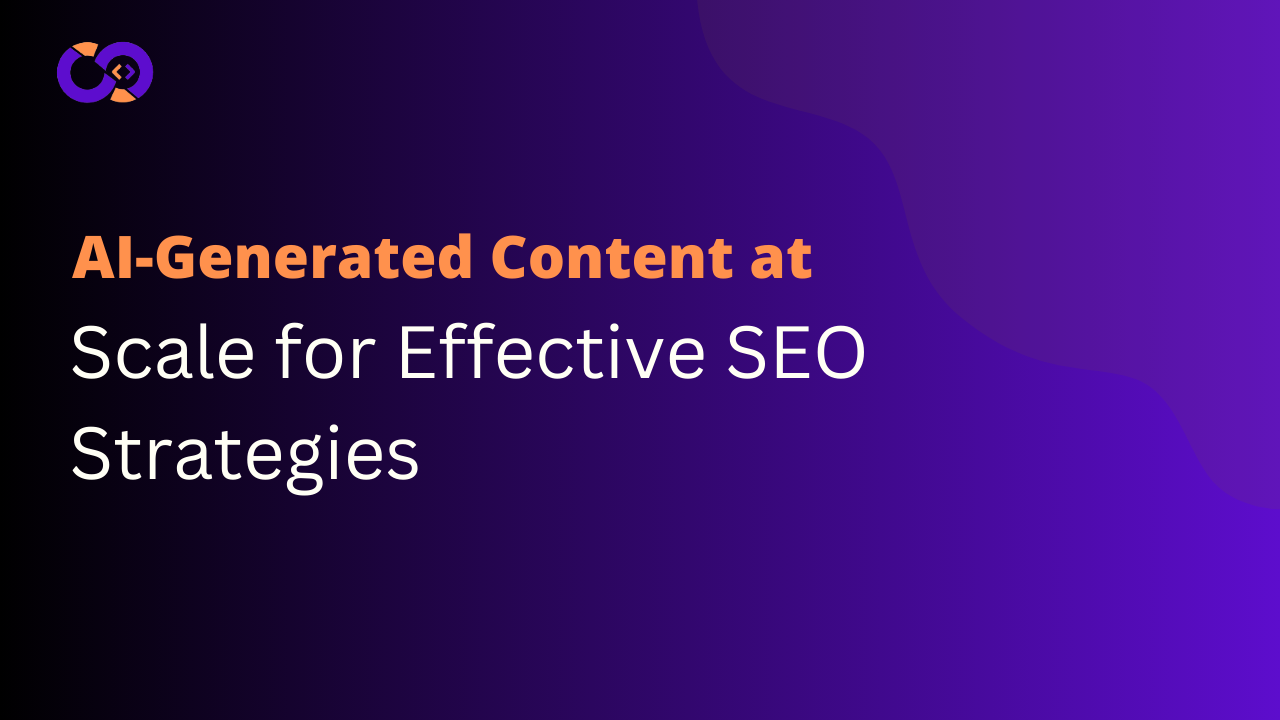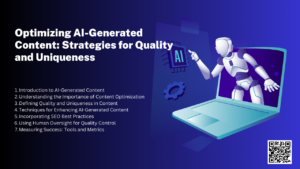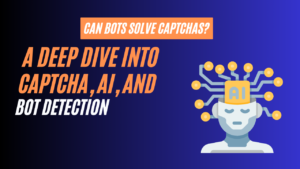- Introduction to AI-Generated Content
- The Importance of Content in SEO
- AI Tools for Content Generation: ChatGPT and Jasper
- Scaling Content Production with AI
- Maintaining Quality in AI-Generated Content
- Adhering to Google's Guidelines
- Case Studies of Successful AI Content Strategies
- Future Trends in AI and Content Generation
- Conclusion: The Balance of AI Content and Human Oversight
Introduction to AI-Generated Content
In recent years, the emergence of artificial intelligence (AI) has significantly transformed the landscape of content creation. AI-generated content refers to text, images, or multimedia produced by algorithms, utilizing machine learning and natural language processing technologies. This innovative approach allows for the rapid generation of content, often tailored to specific audience needs and preferences, effectively enhancing engagement and relevance.
The technology behind AI-generated content involves advanced algorithms that can analyze vast amounts of data and understand context, tone, and subject matter. By employing techniques like deep learning and neural networks, these systems can produce human-like text that meets high-quality standards. This evolution in content creation offers businesses a valuable tool to efficiently create informative and relevant materials while optimizing their search engine visibility.
Leveraging AI for content generation not only streamlines the creation process but also improves productivity. Marketers and content creators can harness these AI capabilities to address diverse topics, create blog posts, generate product descriptions, and even draft social media updates rapidly. The adaptability of AI-generated content enables businesses to maintain a consistent online presence while remaining responsive to trends and consumer preferences.
Moreover, AI-generated content has revolutionized search engine optimization (SEO) strategies. By producing relevant and high-quality content at scale, organizations can directly improve their search rankings and visibility. As search engines increasingly prioritize content quality and relevance, utilizing AI technology allows marketers to produce optimized content that aligns with SEO best practices. In this fast-paced digital era, understanding and integrating AI-generated content into marketing strategies can lead to significant advantages in reaching target audiences effectively.
The Importance of Content in SEO
Content serves as the foundation for search engine optimization (SEO) strategies. Its relevance and quality significantly influence search engine rankings and user engagement. At the heart of effective SEO lies keyword optimization, a technique where specific phrases are strategically integrated into content to enhance visibility in search results. Search engines gauge the relevance of content based on its alignment with user queries. Therefore, identifying the right keywords and incorporating them naturally is imperative for any successful SEO approach.
The relevance of content cannot be overstated, as it not only addresses user intent but also affects the overall authority of a website. High-quality content that resonates with the audience often encourages visitors to spend more time on a site. This user engagement increases dwell time, a factor that search engines consider when determining the value of a webpage. Furthermore, relevant content fosters a connection with readers, leading to higher rates of social sharing and backlinks, which further enhance a site’s SEO effectiveness.
Moreover, producing high-quality content establishes a brand as a thought leader within its industry. By offering insightful articles, comprehensive guides, and engaging posts, organizations can cultivate trust and loyalty among their audience. This trust translates into increased traffic, as users are more likely to rely on and return to a site that consistently provides valuable information. In this competitive digital landscape, the ability to attract and retain visitors hinges on the quality of content presented.
Ultimately, the significance of content in SEO is clear. By focusing on keyword optimization, ensuring content relevance, and consistently producing high-quality material, businesses can improve their search engine rankings and consequently achieve their marketing objectives. Crafting compelling content not only aids in attracting organic traffic but also plays a crucial role in fostering lasting relationships with users.
AI Tools for Content Generation: ChatGPT and Jasper
In the rapidly evolving digital landscape, AI tools for content generation have emerged as vital resources for marketers and content creators. Among the notable options are ChatGPT and Jasper, both of which offer unique functionalities tailored to various content needs. These tools leverage advanced algorithms to produce engaging and relevant text, making them invaluable for developing SEO strategies.
ChatGPT, developed by OpenAI, is particularly known for its conversational abilities. This AI model excels in generating detailed and nuanced responses, which can be harnessed to create a wide range of content types such as blog posts, articles, and chatbot dialogues. Users appreciate its intuitive interface that allows for a seamless interaction, fostering creativity and innovative content generation. Furthermore, ChatGPT offers customizable options, enabling users to specify tone, style, and subject matter, ensuring the content aligns with their brand voice effectively. With its ability to produce coherent narratives, it aids in strengthening the overall content strategy.
On the other hand, Jasper, formerly known as Jarvis, focuses on enhancing productivity through its robust editorial features. This tool is designed specifically for marketers and content creators, presenting templates for various types of content including product descriptions, landing pages, and social media posts. Jasper employs a unique configuration that allows it to understand context better, leading to more targeted content outcomes. Additionally, the platform’s “Boss Mode” empowers users to dictate content with commands, thereby streamlining the writing process. The collaborative capabilities of Jasper further enable teams to work effectively, enhancing workflow and efficiency.
In conclusion, both ChatGPT and Jasper represent cutting-edge AI tools that significantly ease the content creation process while ensuring high-quality output. By integrating these technologies into SEO strategies, businesses can enhance their content marketing efforts, ensuring they remain competitive in today’s digital ecosystem.
Scaling Content Production with AI
In today’s fast-paced digital landscape, the demand for high-quality content is soaring. Businesses and marketers are increasingly turning to artificial intelligence (AI) to scale their content production efforts effectively. AI-driven tools and algorithms have revolutionized the ways in which content is created, allowing for rapid generation of articles, blog posts, and social media updates, thus meeting the relentless demand for fresh content.
One of the most significant advantages of employing AI in content creation is the time savings it offers. Traditional content production often involves lengthy brainstorming sessions, research, and revisions, which can slow down marketing efforts. In contrast, AI tools can quickly analyze vast amounts of data to generate relevant content that aligns with specific keywords and themes. This efficiency not only accelerates the content development process but also frees up valuable resources, enabling marketing teams to concentrate on strategy and creative direction.
Furthermore, AI-driven systems excel at producing content at scale. This capability allows companies to maintain a consistent output that is essential for effective SEO strategies. Consistency in publishing helps improve search engine rankings as it signals to search engines that a website is regularly updated with fresh content. By leveraging AI technology, businesses can ensure that they remain competitive within their industry by consistently delivering engaging and keyword-optimized materials that cater to their target audience’s needs.
The integration of AI in content production does not compromise quality either. Advanced AI models are capable of understanding context, tone, and style, producing write-ups that are not only informative but engaging as well. This balance of quantity and quality is crucial for brands looking to enhance their online presence without overwhelming their marketing teams. In conclusion, employing AI technology for content production significantly boosts productivity and scalability, empowering companies to navigate the evolving digital landscape effectively.
Maintaining Quality in AI-Generated Content
The rise of artificial intelligence in content creation presents both opportunities and challenges for marketers and content creators. While AI-generated content can enhance efficiency and scale, ensuring that the output maintains a high standard of quality is paramount. One of the primary concerns is the coherence of the narrative. AI systems, despite their advanced algorithms, can sometimes produce disjointed text that lacks a logical flow, potentially leading to reader confusion and disengagement.
To address this issue, it is crucial for content creators to implement a thorough review process. This process should not only assess the accuracy of the information presented but also evaluate the overall structure and clarity of the text. Human oversight enables the detection of inconsistencies and ensures that the content aligns with the intended message and audience expectations. Incorporating feedback mechanisms, where content drafts are shared among peers, can also foster refinement and enhance overall quality.
Another integral aspect of ensuring quality in AI-generated content is creativity. While AI can generate high volumes of text, it may lack the unique insights and nuanced perspectives often found in human writing. Therefore, blending AI capabilities with human creativity is a powerful approach. Writers can utilize AI-generated drafts as a foundation, infusing them with storytelling elements, emotional resonance, and innovative ideas that resonate with the target audience. This collaborative approach not only enhances the content’s appeal but also ensures it meets industry standards.
In addition, setting clear guidelines and parameters for the AI tools used can significantly improve the quality of the output. Training these models on specific datasets reflective of your brand’s tone and style will ensure that the content produced aligns more closely with established standards. Through these strategies, organizations can harness the potential of AI-generated content while maintaining the essential quality that captivates and informs their audience.
Adhering to Google’s Guidelines
When harnessing AI-generated content for effective SEO strategies, it is imperative to align with Google’s guidelines to ensure content quality and visibility. Google emphasizes the importance of E-A-T: Expertise, Authoritativeness, and Trustworthiness. Content that adheres to these principles is more likely to rank higher in search engine results.
One of the main risks associated with AI-generated content is the potential for producing low-quality or spammy material, which can lead to penalties. Google employs sophisticated algorithms designed to detect content that lacks genuine value or relevance to users. Focusing on user intent and incorporating rich, informative details are essential strategies in preventing your content from being flagged. AI can assist in generating ideas and drafts, but human oversight is crucial to ensure that it meets quality standards and provides accurate information.
Another important consideration is to avoid content duplication, a common pitfall when utilizing AI tools. Ensure that the generated content is unique and tailored to your target audience’s needs. Conduct regular content audits to identify any similarities with existing material, as duplicated content can harm your site’s authority and search ranking.
Furthermore, writing with a clear structure, appropriate formatting, and the inclusion of relevant keywords can enhance both user experience and SEO performance. It is advisable to balance keyword usage to prevent over-optimization, which can trigger penalties. While AI can help automate aspects of content creation, employing content management strategies and adhering to Google’s quality guidelines ensures that the final output remains valuable and aligned with user expectations.
In conclusion, following Google’s guidelines is fundamental when leveraging AI-generated content. By prioritizing quality and remaining aware of potential risks, you can effectively utilize AI to enhance your SEO strategies while maintaining compliance with recommended practices.
Case Studies of Successful AI Content Strategies
In recent years, numerous businesses have successfully integrated AI-generated content into their SEO strategies, significantly impacting their online presence and overall performance. One of the noteworthy examples is the e-commerce giant, Amazon. By utilizing AI algorithms and machine learning tools, Amazon has been able to generate product descriptions and customer review summaries automatically. This automation not only enhanced the depth of their content but also improved the search visibility of their product listings. Consequently, Amazon witnessed a 25% increase in organic traffic, proving that AI-generated content can effectively drive engagement and conversions.
Another compelling case study comes from the media industry, specifically with The Washington Post. They employed an AI-driven content creation tool known as Heliograf. This system allowed them to cover various events by automatically generating short news articles based on data inputs. For instance, during the 2016 Olympics, Heliograf produced timely updates about medal counts and results. As a result, The Washington Post experienced a significant uptick in website visits and reported a 10% increase in reader engagement. This example illustrates how AI technology can augment news coverage and improve audience interactions.
In the realm of digital marketing, the online travel agency Expedia has effectively utilized AI to optimize their content marketing efforts. By implementing AI solutions to analyze user behavior and preferences, Expedia tailored their blog articles and promotional content based on what their audience sought. This strategy led to an impressive 30% increase in conversion rates for targeted offers. Through these personalized insights, the company was not only able to enhance user experience but also significantly improve their SEO rankings.
The synthesis of these case studies underscores the potential of AI-generated content to transform content strategies across various industries. As businesses continue to embrace this technology, it emerges as a powerful tool for enhancing SEO efforts, driving traffic, and increasing conversion rates.
Future Trends in AI and Content Generation
The landscape of content generation is on the brink of transformation, propelled by rapid advancements in artificial intelligence. Emerging trends in AI technology are continuously reshaping the way content is created, optimized, and disseminated. As algorithms become increasingly sophisticated, we can expect AI-generated content to achieve higher levels of coherence and relevance, significantly impacting search engine optimization (SEO) practices.
One notable trend is the refinement of natural language processing (NLP) capabilities. Future AI models are anticipated to possess an enhanced understanding of context, tone, and sentiment, allowing for the creation of more human-like content. These capabilities will not only improve the quality of Automated Content Generation but also optimize it for SEO purposes, thereby enhancing visibility across search engine results pages. Additionally, advancements in machine learning will lead to more personalized content generation, tailoring material to fit the unique preferences of users while aligning with search intent.
The proliferation of AI-driven tools designed for content optimization is another trend to watch. Tools capable of analyzing vast datasets will provide content creators with insights related to trending topics, audience engagement, and competitive analysis. This data-driven approach will empower marketers to generate targeted content, while also optimizing for SEO by aligning their strategies with constantly evolving algorithms used by search engines. As these tools evolve, marketers will likely leverage them to automate routine tasks, resulting in more efficient and effective content production pipelines.
Furthermore, regulatory and ethical considerations related to AI-generated content are expected to gain prominence. As concerns regarding misinformation and content originality rise, established guidelines and best practices will likely evolve. Marketers and content creators will need to adapt their strategies to ensure compliance while maintaining the effectiveness of their SEO efforts.
Conclusion: The Balance of AI Content and Human Oversight
As the digital landscape continues to evolve, the integration of AI-generated content within effective SEO strategies has become increasingly prominent. Leveraging AI tools allows marketers to produce substantial volumes of content quickly, addressing the growing demand for fresh and relevant material. However, the value of human oversight cannot be overstated. While AI can efficiently generate text and suggest ideas, it often lacks the nuance, creativity, and contextual understanding that human writers bring. Thus, a balanced approach that combines both AI capabilities and human expertise is essential.
To successfully harness AI-generated content, organizations should establish clear guidelines regarding their content goals and target audiences. Understanding the needs and preferences of the intended audience can greatly enhance the relevance and effectiveness of the output. Additionally, it is crucial to maintain strict quality control measures. Implementing thorough review processes enables practitioners to catch potential inaccuracies or errors, ensuring that the final content is aligned with brand voice and messaging.
Furthermore, organizations should consider using AI tools as assistants rather than replacements. This strategy fosters collaboration between technology and human skill, enriching the content with both efficiency and depth. By utilizing AI to conduct keyword research, identify trending topics, and optimize metadata, content creators can focus their efforts on crafting compelling narratives that resonate with their audience. Conducting regular audits of AI-generated content will also compare performance metrics, helping to fine-tune future strategies for enhanced engagement.
In conclusion, the most effective SEO strategies will incorporate both AI-generated content and human oversight. This synergistic approach not only streamlines content creation processes but also ensures high-quality outputs that meet the demands of an ever-changing digital environment. By embracing these best practices, organizations can optimize their content for search engines while fostering meaningful connections with their audience.




